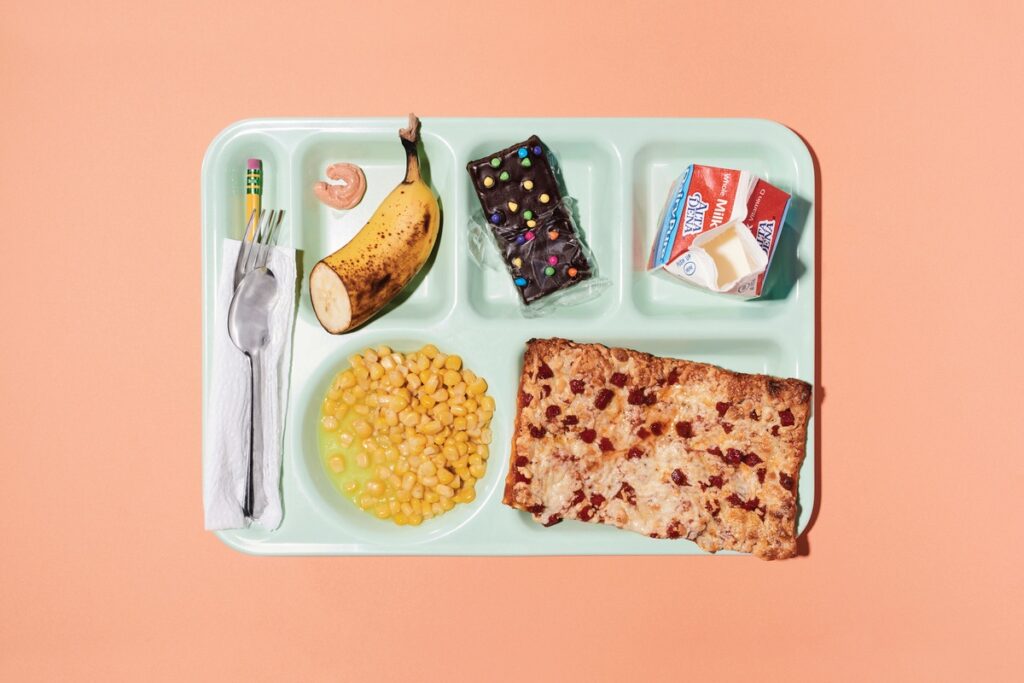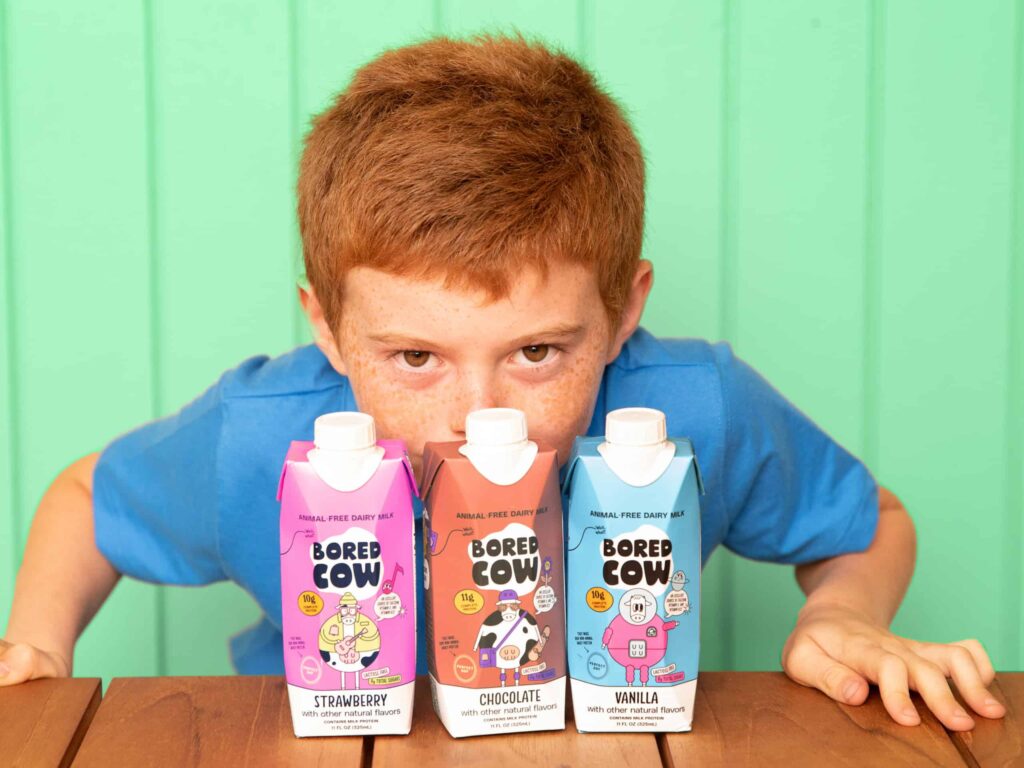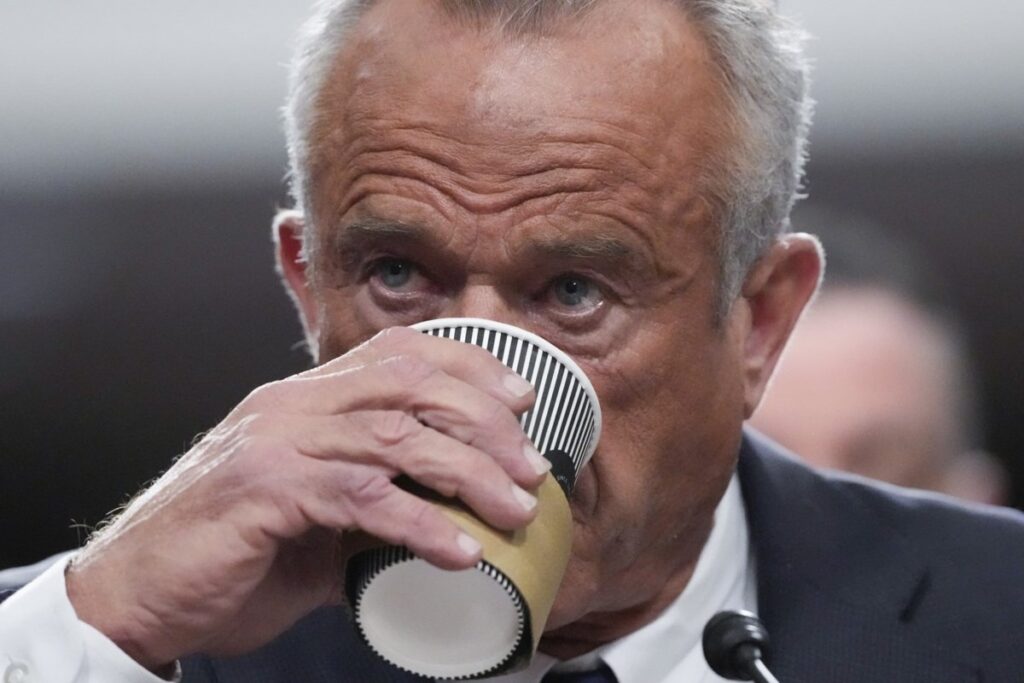Milk Aisle Consensus: Democrats & Republicans Unite in Push for Non-Dairy Options in Schools
7 Mins Read
A bipartisan bill is calling on Congress to provide non-dairy milk options in the national school meal programme to cater to lactose-intolerant and diet-restricted students.
It’s becoming rarer and rarer to see US Democrats and Republicans work together on a national-level issue, and yet one senator known for his bipartisan efforts is bucking the trend yet again.
John Fetterman, a Democratic senator from Pennsylvania, is leading a bill to make non-dairy milk options more accessible in schools across the nation. Introduced last week, he was joined by fellow senators Cory Booker (the New Jersey Democrat who made headlines for the longest speech in Senate history last week) and John Kennedy (a Republican senator from Louisiana).
They’re seeking to amend the National School Lunch Act to make plant-based milk more easily available in schools for children who cannot or do not drink dairy. Currently, to be reimbursed for their meal in schools, the act requires all kids to have cow’s milk on their trays, regardless of whether it suits them or not.
“This bipartisan and bicameral legislation will bring greater equity to the lunchroom, by giving students the option to choose a nutritious milk substitute that meets their dietary needs,” said Booker.
What the plant-based milk bill would change

The FISCAL Act focuses on plant-based alternatives “that are nutritionally equivalent to dairy milk for students who are lactose intolerant or may have other disabilities”.
The existing school lunch law requires that schools “shall offer students a variety of fluid milk”. The proposed Freedom in School Cafeterias and Lunches (FISCAL) Act would see this language updated, replacing “fluid milk” with “milk, including fluid milk and plant-based milk”.
In case a plant-based milk doesn’t meet the guidelines, the bill notes that these need to be “consistent with nutritional standards” established by the agricultural secretary.
The existing act has a subparagraph that addresses non-dairy milk, which states that “a school may substitute for the fluid milk” if students can’t consume dairy because of a medical or dietary need, but this is only possible if the school notifies the state agency that it is making this change, and if the student gets a signed note from a parent or doctor.
The FISCAL Act proposes removing this provision altogether to make plant-based milk options more equitable and on par with dairy in schools. “We need to be doing whatever it takes to make sure our kids are fed in school,” said Fetterman. “This bipartisan bill cuts the unnecessary red tape in our nutrition assistance programs so students can access meals that work for them and their dietary needs.”
If passed into law, the act would require public schools to reimburse local school districts for a plant-based milk that’s nutritionally equivalent to dairy. The USDA already reimburses schools for 1% and non-fat cow’s milk, providing $1B to institutes across the country.
Why lawmakers are batting for plant-based milk

One of the main drivers of the FISCAL Act is lactose intolerance, which affects around half of the nearly 30 million children who benefit from the National School Lunch Program (NSLP), according to the senators.
“Most of this nation’s children of colour are lactose intolerant, and yet our school lunch program policy makes it difficult for these kids to access a nutritious fluid beverage that doesn’t make them sick,” said Booker, who is famously vegan.
Indeed, lactose intolerance rates are especially high among people of colour, with 65% of Hispanic and 75% of Black Americans suffering from the condition. That number rises to 90% for Asian Americans and 95% for Native Americans.
The senators also cite the USDA’s own findings, which indicate that 30% of milk cartons served in schools are thrown in the trash unopened. Another study found that kids discard 150 million gallons of milk per year, leading to food waste amounting to $400M in tax dollar losses.
“There are over 30 million food-insecure children in this country, yet current school lunch policies waste $400M worth of food each year,” said Fetterman, underlining a growing climate and economic priority in the US. “Feeding our kids and keeping them healthy isn’t a red or blue issue.”
Milk is hot and whole in the MAHA era

This latest effort comes a year after the USDA updated its Special Supplemental Nutrition Program for Women, Infants, and Children (WIC) to allow recipients access to plant-based milk, yoghurt and cheese.
They remain elusive in schools, and the sheer power of the dairy industry can be seen in the fact that students from institutes participating in the NSLP are legally barred from publicly criticising cow’s milk. This came to national prominence in 2023, when a student in Los Angeles won a lawsuit against her school, which ruled that students have a right to non-disruptive speech critical of dairy under the 1st Amendment.
Milk is a hotly debated aspect of US school policy. The FISCAL Act itself is a companion measure to the Whole Milk for Healthy Kids Act, which seeks to overturn an Obama-era reform that prohibited full-fat milk from being part of the NSLP. That measure was aimed at reducing childhood obesity rates, and criticised by the dairy industry for plunging milk sales.
The whole milk bill has gained bipartisan support in both the Senate and the House of Representatives, including Fetterman himself, who co-sponsored the legislation: “Kids need wholesome, nourishing food to grow strong and stay healthy, and whole milk is packed with the nutrients they need,” he said.
It’s a sentiment echoed by the new health secretary, Robert F Kennedy Jr. As part of his Make America Healthy Again (MAHA) initiative, he has called for the Head Start programmes – which provide health and nutrition services for kids from low-income families – to switch from low-fat dairy to whole milk, and labelled the USDA’s dietary guidelines as “antiquated”.
We’ve been here before

If all this feels familiar, that’s because it is. During his first term, President Donald Trump’s administration worked in tandem with the dairy industry, which bore the brunt of his then trade war. American dairy farmers faced $1.5B in retaliatory tariffs from China and Mexico.
In 2018, the Trump government handed a $50M bailout to the industry, buying milk to give to food banks and schools, and made direct payments worth $127M to dairy farmers.
Meanwhile, in 2023, under Joe Biden’s presidency, Fetterman, Booker and colleagues introduced the Addressing Digestive Distress in Stomachs of Our Youth (ADD SOY) Act, calling for public schools to offer dairy-free milk options to kids at lunch. That never went anywhere, but the FISCAL Act is the 2025 iteration of this bill.
Here’s the thing, though. In the 2019 dietary guidelines, the USDA allowed schools to serve low-fat flavoured milk (overturning Obama-era legislation), despite 96% of public respondents being against the move. The agency is already in the crosshairs of the livestock industry over proposed recommendations to prioritise plant proteins in this year’s update to the guidelines.
For a country whose policymakers ruled that pizza could be considered a vegetable in school lunches – thanks to lobbying efforts – the thirst for milk shouldn’t come as a surprise. In 2024 alone, the dairy industry spent over $7.6M lobbying for issues, including school lunches.
There’s one key difference between the milk wars in Trump’s first and second terms. In 2018, even though milk production was on the rise, sales were not – they fell by 6% from the year before. In contrast, plant-based milks saw a 9% hike in sales.
That is no longer the case, as the raw milk craze takes hold, thanks to RFK Jr and a suite of ‘wellness’ influencers, despite stark health warnings. Sales of dairy milk grew by 2% in 2024, with whole milk intake up by 3% – though unlike six years prior, non-dairy milk was on the decline, with sales dropping by 6%.
It remains to be seen how the whole milk and plant-based acts end up. Dotsie Bausch, a vegan Olympic medallist who has helped eliminate the non-dairy surcharge in chains like Tim Horton’s and Dunkin through her non-profit, Switch4Good, puts it best: “It’s no longer 1945, and we are a multicultural nation and need individual free choice to reign. We don’t offer kids only one food to eat, and we must stop offering them only one drink.”



